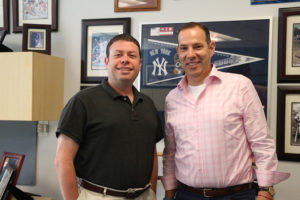Editor’s Note: Sponsored by Monday Properties and written by ARLnow.com, Startup Monday is a weekly column that profiles Arlington-based startups and their founders, plus other local technology happenings. The Ground Floor, Monday’s office space for young companies in Rosslyn, is now open. The Metro-accessible space features a 5,000-square-foot common area that includes a kitchen, lounge area, collaborative meeting spaces, and a stage for formal presentations.
For healthcare insurance companies, compiling and submitting data to state and federal governments is a long process, but an Arlington company may have an answer.
Babel Health, which is based in Courthouse, provides a information system for health insurance companies that validates and reformats data to make it ready to submit to state and federal governments, said co-founder Mark Tobias.
Insurance companies upload data for patients, including birth dates, the medical code, names, admittance dates, etc., into the system. It then goes through the data checking for irregularities as well as checks it against editing rules that look at format and accuracy, such as making sure a person with a death date can’t have an admittance date.
‘We are basically the last guardian to find and protect the data,” Tobias said.
The system will then send the data back to the healthcare company to let them fix the errors. Once the data passes validation checks, the system reformats it to fit the various forms healthcare companies have to submit.
“It helps insurance plans get their data together with more integrity and more accuracy,” co-founder Oron Strauss said.
The company works with smaller and medium sized healthcare companies and recently signed their first client. The company provides the service for a reasonable cost, which makes them ideal for medium-sized companies that would not usually be able to afford a sophisticated data system.
The company helps insurance plans cut down costs, which in turn help them keep plans more reasonably price, Tobias said.
“At the end of the day, so much is driven by cost,” he said.
Although the company is young, Strauss and Tobias already have long term goals for it. They both want to bring the system to healthcare providers to increase efficiency and compliance, Strauss said.
The company is not the first run by Strauss and Tobias. The two have been business partners for 18 years and have founded several business ventures, including Pantheon, a software company that works with nonprofits. Many of the employees working for Pantheon also work for Babel Health and helped build the software program that edits and cleans the data.
Building the software from the ground up has its benefits, the most important being the security features that are incorporated into the program. That’s especially notable in the wake of security breaches at the federal Office of Personnel Management and at large retail chains like Target.
Healthcare plans work with multiple levels of privacy acts including the Health Insurance Portability and Accountability Act, better known as HIPAA. By building the system, Babel Health worked to make sure the data is compliant with privacy acts and safe from data breaches.
“It’s certainly a key priority for us and our clients, and rightly so,” Strauss said.
The OPM leak is not the only national news that concerns the company. Healthcare policies are changing with the introduction of the Affordable Care Act. While the act did not change the system requirements, Tobias and Strauss said they followed the ACA-related Supreme Court cases in order to keep the system updated.
“The market’s here regardless of what happens,” Strauss said. “We just need to be nimble to adjust.”
Challenges like that are nothing new to the two founders.
“At the end of the day, there are plenty of things you are surprised by,” Tobias said. “It’s how you react to them.”
The company has faced a number of other surprises, but for Strauss the amount of complexity in healthcare was the biggest shock.
“I think the thing that surprised me is even the experts in the field don’t have all the answers,” he said.



